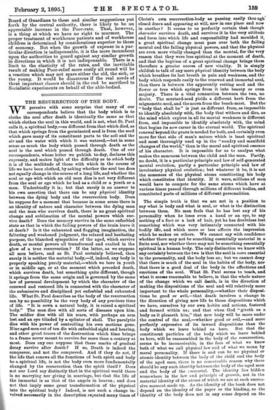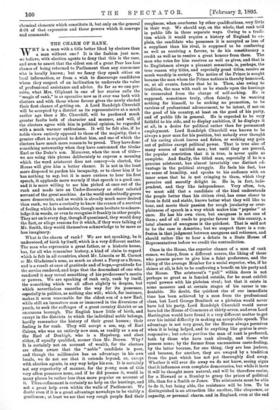THE RESURRECTION OF THE BODY.
WE perceive with some surprise that many of our correspondents believe that the body which is to clothe the soul after death is identically the same as that which clothes the soul in this world, and is not, what St. Paul calls it, a spiritual body,—as different from that which died, as that which springs from the germinated seed is from the seed which gave many of its constituent parts to the soil and the air and the water with which it was watered,—but in some sense as much the body which passed through death as the soul is the soul which passed through death. One of our correspondents, whose letter we publish to-day, declares this expressly, and makes light of the difficulty as to which body it is of the multitude of those with which in the course of life we have been clothed, by asking whether the soul too does not equally change in the course of a long life, and whether the soul or ego with which an old man dies is not very different from the soul or ego which he had as a child or a youth or a man. Undoubtedly it is ; but that surely is an answer to his own assertion that there can be any physical identity between the dying body and the resurrection body. Does he suppose for a moment that because in some sense there is an identity of nature and character between the dying man and the man who survives death, there is no great spiritual change and sublimation of the mental powers which sur- vive death P Does the memory survive in the same enfeebled state as that in which the failing powers of the brain leave it at death ? Is it the exhausted and flagging imagination, the faltering and weakened judgment, the relaxed and hesitating purpose, the blanched sympathies of the aged, which survive death, or mental powers all transformed and exalted in the glow of a true resurrection ? If the latter, as we suppose all men believe, and as St. Paul certainly believed, then surely it is neither the material body,—if, indeed, any body is properly speaking purely material,—which we bore in youth or in middle age, or at the moment which preceded death, which survives death, but something quite different, though it springs from the same origin and is governed by the same law of personal development by which the character of the renewed and restored life is connected with the character of the submissive and disciplined yet enfeebled and exhausted life. What St. Paul describes as the body of the resurrection can by no possibility be the very body of any previous time of life. " It is sown a natural body, it is raised a spiritual body." The man dies with all sorts of diseases upon him. The soldier dies with all his scars, with perhaps an arm lost and an eye blinded by a splinter of shell. The paralytic dies with his power of controlling his own motions gone. Nine aged men out of ten die with enfeebled sight and hearing, and other great traces of the destruction which time brings to a frame never meant to survive for more than a century at most. Does any one suppose that these marks of gradual decay survive after death P If so, Death is indeed the conqueror, and not the conquered. And if they do not, if the life that renews all the functions of both spirit and body be a spiritual life, is not the body even more fundamentally changed by the resurrection than the spirit itself ? Does not our Lord say distinctly that in the spiritual world there is no marrying nor giving in marriage, but that the life of the immortal is as that of the angels in heaven ; and does not that imply some great transformation of the physical into the spiritual body ? Indeed, is not such a change in- volved necessarily in the description repeated many times of Christ's own resurrection-body as passing easily thro ugh' closed doors and appearing at will, now in one place and now in another ? It seems to us perfectly certain that though character survives death, and survives it in the very attitude and form into which life and responsibility had moulded it, a great spiritual change must pass over both the failing mental and the failing physical powers, and that the physical are even more vitally changed than the mental, for the very reason that they were less spiritual at the moment of death, and that the baptism of a great spiritual change brings them therefore a greater access of new vitality. It is simply childish to talk of any more physical identity between the body which breathes its last breath in pain and weakness, and the body which responds easily to the renewed and immortal soul, than there is between the apparently rotting seed and the flower or tree which springs from it into beauty or even majesty. There is a vital connection between the two, no doubt. The mustard-seed yields a different herb from the mignonette-seed, and the acorn from the beech-mast. But the " body that shall be" is just as different from, as impossible to identify absolutely with, the body that withers and dies, as the mind which expires in all its mortal weakness is different from, and impossible to identify absolutely with, the mind that begins its new career in the eternal world. The spiritual renewal beyond the grave is needed for both, and certainly even more for that side of man's nature which is least spiritual and moat thoroughly used up in the "sundry and manifold changes of the world," than is the moral and spiritual essence of his character. It is impossible for us to analyse what makes the sameness between the child and the man. Partly, no doubt, it is a particular principle and law of self-generated mental evolution, partly a particular principle and law of involuntary physical evolution; but whatever it be, it is not the sameness of the physical atoms constituting his body which constitutes that identity. If it were, millions of men would have to compete for the same atoms which have at various times passed through millions of different bodies, and constituted parts of millions of different personalities.
The simple truth is that we are not in a position to say what is body and what is soul, or what is the distinction between them. No man feels that he has lost any of his personality when he loses even a hand or an eye, to say nothing of a foot or a lock of hair, yet he has doubtless lost something which was very intimately connected with his bodily lffe, and which more or less affects the impression which he makes on others. We cannot say with confidence whether there may not be something essentially material in a finite soul, nor whether there may not be something essentially spiritual in a human body. The only distinction we know with any certainty between the two is that the soul is more essential to the personality, and the body less so ; but we cannot deny that there is much of the soul in the habits of the body, nor that there is a good deal of the body in the affections and emotions of the soul. What St. Paul seems to teach, and what it seems reasonable to believe, is that the whole nature of the change which we call death, is in the direction of making the dispositions of the soul and will relatively more important to the whole personality,—whether their disposi- tions be good or evil,—that death involves a change in the direction of giving new life to those dispositions which we have, ourselves by our own habits and actions, fostered and formed within us ; and that when God " giveth us a body as it pleaseth him," that new body will be more under the control of the soul,—whether good or evil,—and more perfectly expressive of its inward dispositions than the body which we leave behind us here. But that the constituent particles of the body which we leave behind us here, will be reassembled in the body of the resurrection, seems to be inconceivable, in the face of what we know both of what we call physical law and of what we mean by moral personality. If there is and can be no physical or atomic identity between the body of the child and the body of the aged man, there is no conceivable reason why there should be any such identity between the body of the aged man and the body of the 1 mmortal. The identity lies hidden somewhere in the law and principle of growth, not in the material identity of the atoms of which we are at each succes- sive moment made up. As the identity of the book does not depend on the identity of the paper or the binding, so the identity of the body does not in any sense depend on the
chemical elements which constitute it, but only on the general drift of that expression and those powers which it conveys and commands.



































 Previous page
Previous page